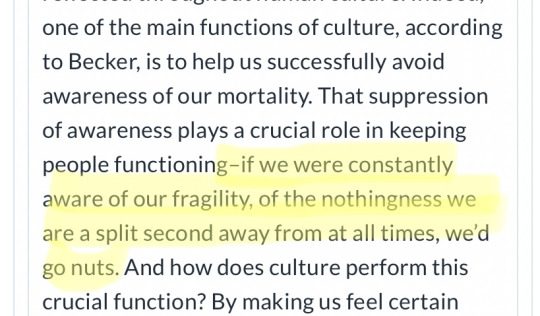She/her - the internet is a fascinating place - media consumer - bread and circuses enthusiast
Don't wanna be here? Send us removal request.
Text
jokes to make after failure that aren’t self-deprecating:
I’m the best to ever do it
Nobody saw that (best if said loudly)
No one’s ever done it like me
I could be President/they should make me President
Behold, a mere fraction of my power!
The public wants to be me soooooo bad
I’m an expert in (thing you just failed at)
How could this have happened to god’s favorite princess?
Nothing ibuprofen and a glass of water cant fix
I’m being sabotaged
173K notes
·
View notes
Text
*scrolling tumblr* hmmm. i agree with the sentiment of this post, but the phrasing feels off to me. it doesn’t really have that Reblog factor, you know? *scrolls* oh good, a post that just says “i jerk off till my penis scrweam” . i better reblog this
97K notes
·
View notes
Text
Kiki Ely’s “Complete Guide to Self-Care”: A Book Review
This book was rated 3 1/2 stars by me, but will be rounded up to four if half-ratings aren’t allowed.
A link to Five Below’s listing of the book can be found here: https://g.co/kgs/ACqwtrL
Self-care is a broad and complicated concept, but a necessary one to engage with. When most people think of self-care; they think of face masks, guasha, everything showers, watching your favorite TV show, and getting eight hours of sleep. While these fall under the self-care umbrella, it disguises the more troublesome parts of self-care. Caring for yourself goes beyond the physical — it’s emotional, it’s spiritual, it’s social, it’s educational. Self-care could be a moment of prayer, cutting off a toxic friend, visiting a relative’s grave, or forcing yourself to eat a vegetable after eating nothing but cookie dough for three days straight (I have personal experience with that one). But framing self-care as something you do to yourself and not with yourself benefits society economically. If we convince ourselves that we care about our bodies and minds by putting on a twenty-dollar agave face cream and watching the latest episode of Love Island, we both buy into a cycle of vicious consumerism and trap ourselves in it. One important aspect of self-care is the recognition that you deserve better; that you deserve a clean house, good mental health, and a healthy body. And unfortunately for us, we can’t achieve that through merciless jade rolling. This is where Kiki Ely’s “Complete Guide to Self Care” comes in. If I may represent myself as a hypocrite for just a moment, I actually bought this book at Five Below along with a Bluetooth mouse and a tube of clear mascara. After completing my cycle of previously mentioned vicious consumerism, I cracked open the lavender-colored softcover book to find a trove of valuable self-care information that is worth sharing with others. Much like any other piece of literature on the planet, however, this book does not come without its flaws.
The Good
This book is well thought-out and has many promising qualities. The book format is artistic and pleasing to the eyes, eliciting readers to take their time to view every page. Information is succinct and to the point; readers don’t have to comb through the text to find valuable information.
Consistency
Consistency is one of the most important parts of writing. For fiction books, consistency is a requirement for me to understand the plot. If a book has terrible consistency, chances are it won’t score high in any other category either. This book is divided into sections - physical, intellectual, social, spiritual, and emotional self-care. Already it was far different from many other types of self-care resources available on the internet, which encourage consumerist solitude — upholding imagery of a female hermit cooped up in her soft girl bedroom applying one of five hundred creams on her face. Ely insists that self-care takes many forms by using an illustration of a self-care flower with its petals taking up different categories. I will give some biased bonus points for using imagery I am quite familiar with in my Unitarian Universalist faith. Throughout the book, we did not stray from the original topics presented in the flower imagery. I see more examples of consistency in nonfiction than I do fiction, but good examples of consistency should be praised, no matter how simple they are.
Non-Passive Writing
The short-and-sweet paragraphs in this book are prime for passionate writing. Beginning the chapter “Physical Self-Care” with a quote from Buddha hooked me in for certain. Every word of this book has a purpose; there’s no lengthening fluff, no thirty-minute tangents about how your second cousin knows a guy (looking at you, internet pie recipes), and no irrelevant information. In “Complete Guide to Self Care”, what you see is what you get. I appreciate the mission to provide important information to readers without thinking about how it’ll affect the length of your book.
Developed Topics
The topics in this book are short, but detailed and developed. This is fantastic for a busy reader, as they won’t have to scour walls of text to find examples of what’s useful to them. Ely suggests to readers of her book that they skim through and pick interesting topics, or read the whole thing cover-to-cover. Either way, you’re getting valuable information that you may not have known before reading.
Learning New Things
I was ignorant of what grounding was before I read this book. Now that I have read this book, I can safely say that people need to do it more often. Do I believe in the whole “electric signals from the ground make your body healthier” hypothesis? I don’t know. But I cannot understate the importance of getting your feet and hands into some dirt! Human culture has become so separate from our environment, which is disheartening to bear witness to. Self-care should include connecting with our environment just as much as connecting with ourselves.
This book also has a helpful section on chakras and how they may relate to certain mental and physical symptoms. There’s also brief notes directing readers on how to open these chakras and rid yourself of the icky symptoms you may feel when these chakras are closed. Although I found this short analysis to be helpful, there are criticisms of its addition that I share with other reviewers. An example of these criticisms will be further into this review.
Enjoyability
The content of a book does not determine how much I enjoy it. It’s more so how the book is written — and this book was written with a lot of care and enthusiasm. Ely writes like a friend giving you necessary life advice, which makes the book more helpful and personable. Reading this was an enjoyable experience and didn’t feel arduous or chore-like at all — making it a good choice for readers who may suffer from conditions like depression or chronic fatigue.
Goal-Meeting
This book had two goals:
Get people to learn more about different self-care techniques
Allow people to use the techniques pertinent to their own lives.
“Complete Guide to Self Care” completed these goals with efficiency. The guides are easy to follow and don’t require large amounts of money or time. Many self-care guides encourage people to go beyond their personal lives and cultures in favor of strict adherence to guidelines, but this book acknowledges that self-care will look different for everyone. It doesn’t have to be one size fits all!
Recommendability
Typically, I wouldn’t recommend books with low originality and grammar errors to other people, but this book is easy to pass on to someone else when you’re done with it. It’s short, to the point, and people can flip and read whatever sections they want. It’s a nice little book that you can share with others — a good choice for a little free library, or a donation to a mental health resource. “Complete Guide to Self Care” would also make a useful gift for a high schooler interested in their mental and physical health.
The Bad
While many parts of this book were satisfying to read, there were a couple of things that needed some improvement.
Grammar
I wouldn’t usually be this strict about grammar, considering that my grammar is quite horrendous. But when punctuation is missing and letters are improperly capitalized, it removes me from the streamlined reading experience and makes me question the context of the sentence I’m trying to read. Poor punctuation and grammar were not prevalent throughout the book, but noticeable enough in a few places.
Originality
As far as this book goes, it’s not original. Is this a bad thing? Not always. But is it bad when people can get the same information on social media for free? Yes. This book doesn’t have much setting it apart from other self-care books on the market, let alone the multitude of self-care information available on social media. Ely is a self-care influencer — why would someone buy her book if it contains the same information you can research for free? This book needs a couple of extra perks to set it apart from the crowd.
The Ugly
You’ve seen the good, you’ve seen the bad. Now what about the ugly? “The Ugly” subtitle fits any part of the book that I feel wasn’t impactful. This doesn’t mean that it was bad, rather it was a neutral aspect of the book that didn’t affect me as much as the others.
Strong Emotions
Not every book will make me feel strong emotions, and that I can understand. Especially non-fiction, educational works such as this; which teach and not invoke. A focus on making the reader feel their emotions could be helpful, since self-care has so much to do with the prevention and treatment of mental disorders and conditions.
Reader Criticisms
Lower ratings of this book typically referenced the lack of original information, but there was one Goodreads review of this book that stood out from the rest of the reviews.
In a two-star review, Raquel wrote:
“Unfortunately, while the author gave advice on meditation and chakras, never once did she reference or explain where these practices came from and who created them.”
While I found the chapter about chakras to be personally helpful, this review made me reflect. Indeed, Ely is a white woman writing about chakras and meditation. How helpful is her information if she is not a primary source? When I read this review, I thought about the westernization (dare I say, colonization) of yoga (another practice mentioned in this book). According to the helpful Google Arts and Culture website’s visual presentation on yoga, the practice is around 5,000 years old and strongly linked to Hinduism as one of the six schools of philosophy. Is yoga Hinduism? Not necessarily. But it is a Hindu practice, which begs the question — how distant are we from the original, non-western practices of yoga? What about chakras and meditation? I stop my speculation here, as many others offer far better analyses of yoga’s westernization than I, a 20-year-old white woman from suburban Maine, could provide.
More positive reviews of the book noted the pleasant visuals emanating a “coffee table” vibe. This isn’t a bad thing, not for a self-care book. People with conditions like anxiety noted the helpfulness of the book for easing symptoms. The visuals would appeal to those with anxiety, eliciting a calming visual experience while you read.
Final Thoughts
“Complete Guide to Self Care” by Kiki Ely is a pleasant read if you wish to reflect on your self-care habits. It’s a decent refresher and may teach you some new things, but teachings on various cultural practices may require a second source. This book is easy to read and visually appealing, providing benefits for people diagnosed with various neurodivergencies. It’s a casual read; don’t expect to be gobsmacked as you flip the pages, nursing your coffee. A grammar mistake may pop up here or there, but they don’t negate the effort that Kiki Ely put into making this book. Try a couple of new things from the book, and you may find your mood improving.
#book review#book blog#bookish#booklr#bookworm#books and reading#books#bookblr#books & libraries#self care#nonfiction#books to read if you have OCD#books to read if you’re neurodivergent#books to read if you have depression#books to read if you have anxiety
1 note
·
View note
Text
Life may suck but it could be worse. You could be one of those people that willingly pay 100+ dollars for cheaply made polyester garbage. Think about that.
1 note
·
View note
Text
Well, I guess I need to go find culture then because I am consistently aware of my fragility

stfu how DARE you call me out so loudly like this
46 notes
·
View notes
Text
"Accountability" does not necessarily mean "punishment".
Accountability means removing the conditions that caused the harm.
If someone caused harm to others because they were in pain, the solution is to find a better outlet for the pain.
If someone caused harm to others because they had the power to do so, the solution is to take away that power.
You can't accurately separate society into "good people" and "bad people". Anyone would become a villain of some kind if they experienced the right combination of power and pain.
109 notes
·
View notes
Text
Me when my friends are talking about their S/O’s: Omg you guys are so cute together this makes me so happy
Me when my friends are talking about their exes: He will die of hunger and fever. I am responsible for the plagues bestowed upon him. There will be insects of many varieties released in his domicile. A sickness festers in his harvest. The vehicle he relies on will fail. When he approaches the cash register at thine local Wendy’s, his card will decline.
1 note
·
View note
Text

— Brenna Twohy, "I Know It's a Little Late," Forgive Me My Salt (via letsbelonelytogetherr)
7K notes
·
View notes
Text
“In order to heal from MADD you have to accept that your daydreams saved your life at one point :)” they didn’t save me, they kept me dead. Dead to the world, dead to reality, a dead girl walking, DEAD.
2 notes
·
View notes








